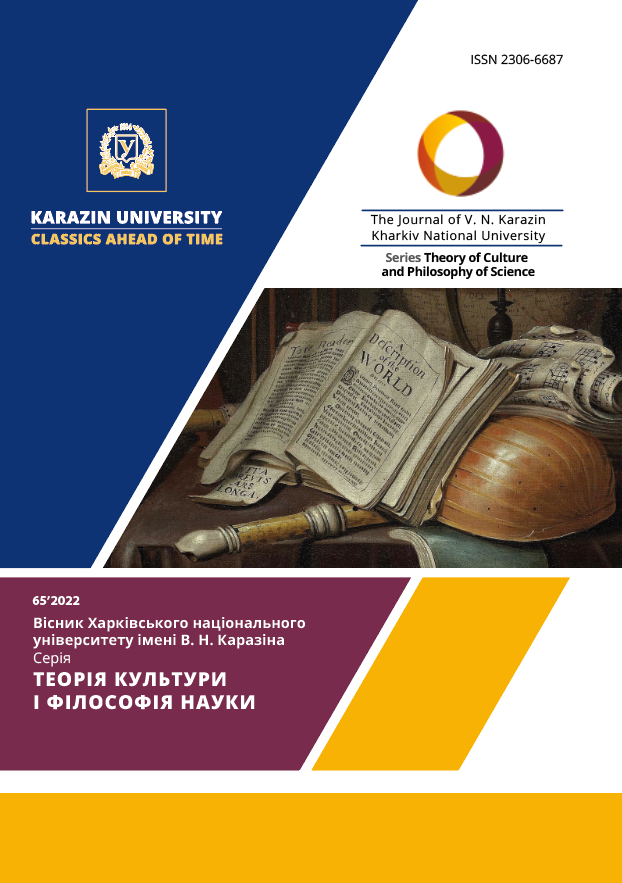SOCIAL AND CULTURAL PHENOMENON OF «NEW SINCERITY»
Abstract
In the late ХХth and early ХХІst century new cultural paradigms were declared, in particular, metamodernism and «new sincerity». Estimates of the latter are ambiguous: some see it as the dominant mood of the modern era, others – only as the marketing or artistic strategy.
The author believes that the social and cultural potential of postmodern irony has not been exhausted yet. In the information society, irony is an anti-repressive mechanism, as well as the way of constituting personal space in a manipulative environment. So it is still premature and even dangerous to devalue it.
Irony is born of disappointment and coexists with sensuality and romanticism. In fact, T. Vermeulen and R. van den Akker, characterizing metamodernism as a combination of irony and sincerity, only pointed out to another neo-romantic turn in art.
However, adherents of different versions of post-postmodernism refer to the objective socio-economic and technological factors that led to the transformation of culture. These include the digital revolution, globalization and the victory of consumerism, global risks and disasters. Although it is doubtful that commercialization and fear contribute to the deepening of the inner life and its sincere manifestation.
The socio-cultural character of the digital age really has such features as spontaneity and enthusiasm. If irony is the desire for independence, then «new sincerity» indicates addiction to something. Unlike the ironist, the «new sincere» does not avoid making choice, but to talk about the revival of existence is to ignore the dependency on manipulative influences. Despite the autism attributed to the new character, he or she is a collectivist who is actively involved in projects not only in virtual space but also in real life. Sharing practices make them accustomed to trust others. They consume any product of mass culture, appropriate any ideas. Being infantile and uneducated, in contradiction to the ironists, they are not ashamed of it, not least because they are not alone in their hobbies.
At the same time, the socio-cultural context devalues direct judgments and generates meta-irony. It arises from an atmosphere of total venality, demonstrativeness, standardness, which does not confirm sincerity. As a result, in addition to or instead of accusations of banality and naivety, which were initially envisioned by the adherents of the «new sincerity», it provokes accusations of artificiality and cynicism.
Downloads
References
Bandrovska, О. Reality as fiction? The concept of «metamodernism» and «metamodern» in contemporary cultural and literary discourse. Foreign philology. № 134. 2021. P. 152–164. (In Ukrainian)
Gaiduk, N. The phenomenon of metamodernism as a re-interpretation of modernism and a conceptual continuation of postmodernism. Bulletin of Mariupol State University. Philosophy, cultural studies, sociology. № 21. 2021. P. 24–31. (In Ukrainian)
Grebeniuk, T. Freedom in the Metamodern World Fiction: the Ukrainian Dimension. The Journal of V. N. Karazin Kharkiv National University. Series «Philology». № 78. 2018. P. 160–164. (In Ukrainian).
Humeniuk, T. Aesthetic aspects of meta- and digimodernism in the concept of post- postmodernism. Issues in Cultural Studies. № 38. 2021. P. 65–75. (In Ukrainian)
Miroshnychenko, V. Metamodernism, oscillation, interpellation. Ukrainian Culture. Cultural studies. № 55. 2017. P. 109–117. (In Ukrainian).
Onishchenko, H. From post- to metamodernism: process of cultural research. Academic Bulletin of Kyiv National I. K. Karpenko-Karyі Theatre, Cinema and Television University. № 29. 2021. P. 60–66. (In Ukrainian)
Onishchenko, H. Metamodernism: theoretical reality or «Figure of Philosophy»? Academic Bulletin of Kyiv National I. K. Karpenko-Karyі Theatre, Cinema and Television University. №. 27–28. 2021. P. 137–144. (In Ukrainian)
Kirby, A. Digimodernism: how new technologies dismantle the postmodern and reconfigure our culture. New York, London : Continuum, 2009. – 282 p. (In English)
Petrova, I. Metamodernism as a concept of cultural studies. Issues in Cultural Studies. № 36. 2020. P. 14–23. (In English)
Friedland, А. New sincerity. Why people are outspoken on social media. NV. 19.02.20. URL : https://life.nv.ua/ukr/blogs/novaya-iskrennost-zachem-lyudi-otkrovennichayut-v-socsetyah- 50071189.html. (In Ukrainian)
Beyond postmodernism. Notes on metamodernism. 2013. URL : http://www.metamodernism.com/2013/03/13/beyond-postmodernism/. (In English)
Binney, S. H. Oscillating towards the Sublime Notes on metamodernism. 2015. URL : http://www.metamodernism.com/2015/04/02/oscillating-towards-the-sublime-2/. (In English)
Bourriaud, N. Altermodern Manifesto. e-flux. 2009. URL:https://www.e-flux.com/announcements/38261/altermodern-manifesto/. (In English)
Kirby, A. The death of postmodernism and beyond. Philosophy now. 2006. URL : https://philosophynow.org/issues/58/The_Death_of_Postmodernism_And_Beyond/. (In English)
Latour, B. Why has critique run out of steam? From matters of fact to matters of concern. Critical Inquiry. № 2. 2004. URL : https://www.journals.uchicago.edu/doi/10.1086/421123. (In English)
Morgan, E. Andy Holden’s Maximum irony! Maximum sincerity! Notes on metamodernism. 2014.URL:http://www.metamodernism.com/2014/09/29/andy-holdens-maximum-irony- maximum-sincerity/. (In English)
Turner, L. (2011). Metamodernist // Manifesto. URL :http://www.metamoder-nism.org/. (In English)
Vermeulen, T., van den Akker, R. Misunderstandings and clarifications. Notes on metamodernism. 2015. URL :https://www.meta-modernism.com/2015/06/03/mis- understandings-and-clarifications/. (In English)
Vermeulen, T., van den Akker, R. Notes on metamodernism. Journal of aesthetics and culture. Vol.2.2010.P.1–14.URL:http://www.eme-rymartin.net/FE503/Week10/Notes%20on%20Metamodernism.pdf. (In English)
Wallace, D. F. E Unibus Pluram: Television and U.S. Fiction. The Review of Contemporary Fiction. 1993. Summer (№ 13:2). P. 151–194. URL : http://jsomers.net/DFW_TV.pdf. (In English)
Citations
“New Sincerity” Interview Strategies: Million Dollar Questions and Smaller Conversational Exchanges
Issers Oxana & Gerasimova Anastasia (2024) Vestnik Volgogradskogo gosudarstvennogo universiteta. Serija 2. Jazykoznanije
Crossref




